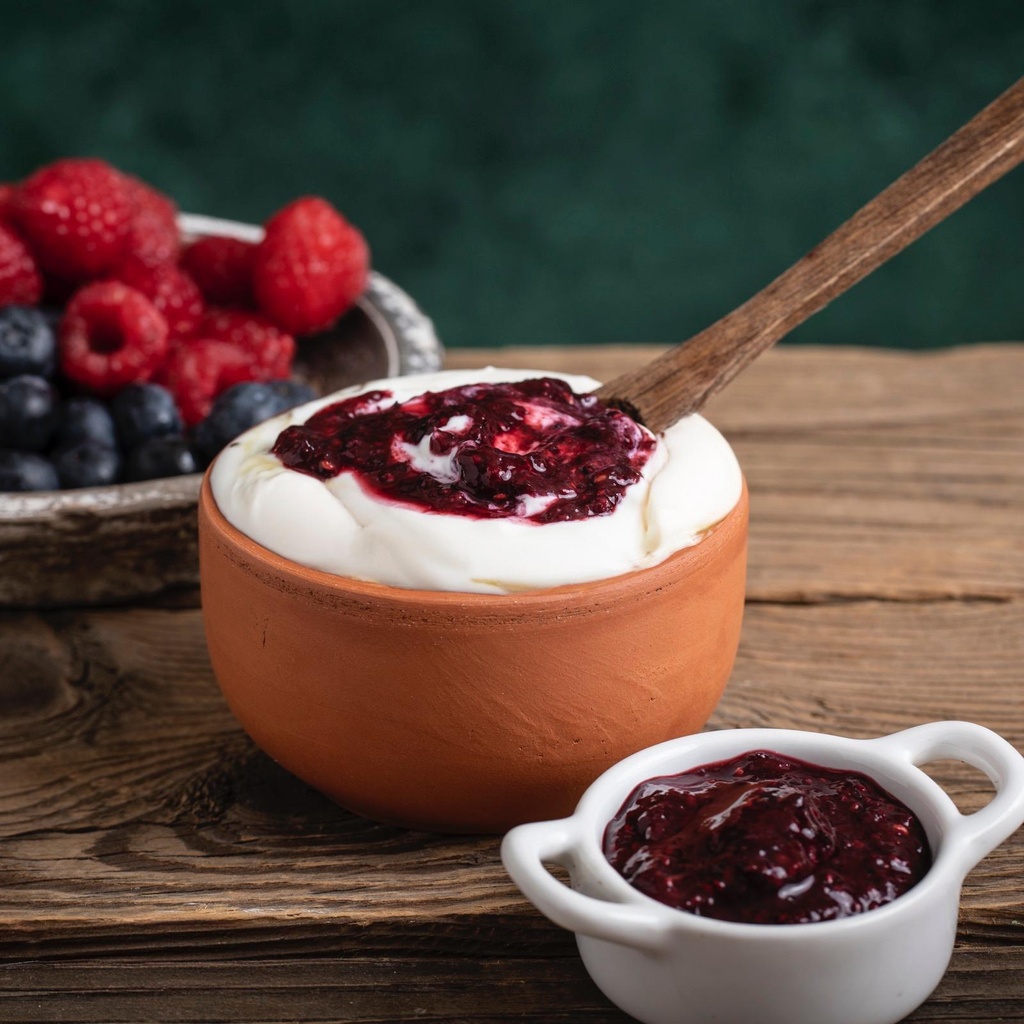150 g
Low fat cow milk , Active life culture , Berries compote ( Berries, Chia seeds , Lemon juice and sweetener )
Stored in an airtight container :
Store in an airtight container in the refrigerator for 10 days
Lactose & Casein
- Simple, Wholesome Ingredients:
- Our Yogurt: Made with only low-fat cow's milk and live cultures. This minimal ingredient list avoids artificial additives, thickeners, and excessive processing.
- Commercial Yogurt: Often contains added sugars, artificial sweeteners, stabilizers (like modified food starch, pectin, or guar gum), preservatives, and artificial flavors to enhance taste, texture, and shelf life.
- Our Yogurt: Traditional Greek yogurt-making involves straining whey, naturally concentrating the protein content.
- Commercial Yogurt: Some commercial brands may add protein isolates to boost the protein content, which isn't the same as naturally concentrated protein. Lower-quality commercial options might have significantly less protein.
- Our Yogurt: Contains only the naturally occurring sugars from milk (lactose), with 0g of added sugars. This is a significant health advantage.
- Commercial Yogurt: Many commercial yogurts, especially flavored varieties, are loaded with added sugars, contributing to empty calories and potential health concerns. Even "plain" commercial yogurts might have added sugars.
- Our Yogurt: Made with live cultures, the traditional fermentation process can lead to a robust and diverse population of beneficial bacteria (probiotics).
- Commercial Yogurt: While most commercial yogurts contain live cultures, the specific strains and their viability (survival rate) can vary greatly depending on processing and storage. Some may add specific strains that aren't traditionally found in Greek yogurt.
- Your Yogurt: The traditional straining process yields a naturally thick, creamy texture and a distinct tangy flavor that is characteristic of authentic Greek yogurt.
- Commercial Yogurt: Some commercial brands use thickeners to mimic the texture of traditionally strained Greek yogurt, which can result in a less authentic mouthfeel. The flavor may also be less complex due to additives.
- Our Yogurt: The traditional method involves fewer processing steps compared to some commercial yogurts that undergo various treatments to extend shelf life or alter texture. Less processing often means a more natural product.
- Our Yogurt: Emphasizes the inherent nutritional benefits of milk and the fermentation process.
- Commercial Yogurt: The focus can sometimes be on creating appealing flavors and textures through additives, potentially compromising nutritional value.
- Our Yogurt: To maintain the highest quality of our greek yogurt , we use high quality milk from kuwaiti farms , which contributes to a superior product
- Commercial Yogurt: Mass-produced yogurt often travels long distances and may have a longer shelf life due to processing and preservatives, potentially impacting freshness.
Here are points highlighting why our traditionally made Low-Fat Greek Yogurt is better than many commercial options:
- Live and Active Cultures: The traditional fermentation process using live cultures naturally introduces beneficial bacteria into our yogurt.
- Less Processing: Compared to some heavily processed commercial yogurts that might undergo heat treatment (which can kill live cultures), our traditionally made yogurt is more likely to retain a higher number of viable probiotics.
- Focus on Natural Ingredients: By using only milk and starter, you're avoiding additives that might negatively impact the survival or efficacy of the probiotics.
To maximize the probiotic benefits of your yogurt:
- Proper Storage: We advise our customers to keep the yogurt refrigerated to maintain the viability of the live cultures.
- Consume Regularly: Consistent consumption is key to potentially experiencing the benefits of probiotics.
When you combine our Greek yogurt with the berry compote, you unlock a powerful synergy of health benefits, particularly for your digestive system:
- Probiotic Power for Gut Health: The Greek yogurt contains "active live cultures" which are beneficial probiotics. These friendly bacteria help maintain a healthy balance in your gut microbiome, supporting digestion and potentially contributing to overall immune function.
- Prebiotic Fuel for Good Bacteria: The berries and chia seeds in your compote are excellent sources of prebiotic fiber. Prebiotics act as food for the probiotics, helping them to thrive and multiply in your gut. This symbiotic relationship enhances the effectiveness of the probiotics.
- Synbiotic Harmony: By combining the probiotics from the Greek yogurt with the prebiotics from the berries and chia seeds, you create a synbiotic effect. This means the probiotics are more likely to survive and flourish, leading to greater digestive wellness and a more robust gut environment.
- Rich in Protein: With 10g of protein per serving, this combination is excellent for satiety, muscle maintenance, and overall body function.
- Heart-Healthy Fats: The healthy fats present contribute to heart health and aid in the absorption of fat-soluble vitamins.
- Antioxidant Powerhouse: The berries are naturally rich in antioxidants, which help combat free radicals and support cellular health.
- Fiber Boost: The combination contributes dietary fiber, essential for digestive regularity, blood sugar management, and a feeling of fullness.
- Vitamin and Mineral Support: This blend provides a good source of Calcium (20% DV) for bone health, and Vitamin C (15% DV) for immune support, along with other essential vitamins and minerals.
- Balanced Energy: The combination of carbohydrates, healthy fats, and protein provides sustained energy without a significant sugar spike.
This Berries Greek Yogurt is incredibly versatile and can be enjoyed at various times throughout the day, depending on your goals and lifestyle. Here are the best times to enjoy it, considering its nutritional profile:
- Breakfast:
- Why: It's an excellent way to start your day. The combination of protein, healthy fats, and fiber will keep you feeling full and satisfied, preventing mid-morning cravings. The carbohydrates provide energy for the start of your day, and the probiotics kickstart your digestive system.
- Benefit: Sustained energy, promotes satiety, supports gut health early.
- Post-Workout (Ideally within 30-60 minutes after exercise):
- Why: As discussed, this is a prime time for consumption. The protein helps repair muscle tissue damaged during exercise, while the carbohydrates replenish glycogen stores. The antioxidants and healthy fats aid in reducing inflammation.
- Benefit: Optimal muscle recovery, glycogen replenishment, reduced soreness.
- Mid-Morning or Mid-Afternoon Snack:
- Why: When you need a healthy pick-me-up that isn't loaded with empty calories. It's much more satisfying and nutritious than a sugary snack. The protein and fiber help curb hunger and maintain stable blood sugar levels.
- Benefit: Curbs cravings, provides sustained energy, prevents energy crashes.
- Before Bed (Light Snack):
- Why: A small serving of protein before bed can help with overnight muscle repair and may contribute to better sleep for some individuals. The slow-digesting protein from Greek yogurt is ideal.
- Benefit: Overnight muscle recovery, promotes satiety without feeling heavy.
Times to Potentially Adjust (or consume in moderation):
- Immediately Before an Intense Workout: While good for sustained energy, consuming a large portion right before a very intense workout might feel heavy due to the fiber and fat content. If you need fuel right before, a smaller portion or something with faster-digesting carbs might be preferred. However, for moderate workouts, it's generally fine.
In summary, the "best" time truly depends on your personal schedule and needs. However, it shines particularly as a breakfast option and an ideal post-workout recovery meal/snack.
- Pre-Workout Fuel (Sustained Energy):
- Complex Carbohydrates from Berries: While not a massive carb load, the berries provide natural sugars for immediate energy and their fiber helps moderate the release, preventing a sugar crash.
- Healthy Fats from Chia Seeds: Chia seeds offer healthy fats which provide a sustained energy source, especially beneficial for longer or moderate-intensity workouts.
- Moderate Protein: The protein from Greek yogurt will contribute to a feeling of fullness and help stabilize blood sugar, providing a steady energy release.
- Post-Workout Recovery (Muscle Repair and Replenishment):
- High-Quality Protein (10g per serving): This is perhaps the most significant benefit for post-workout. The protein in Greek yogurt is rich in essential amino acids, crucial for muscle repair and growth after exercise. This aids in rebuilding muscle fibers that are broken down during a workout.
- Carbohydrate Replenishment: The natural carbohydrates from the berries help to replenish glycogen stores in your muscles, which are depleted during physical activity. This is vital for recovery and preparing for your next workout.
- Anti-Inflammatory Properties: Berries are packed with antioxidants and chia seeds contain omega-3 fatty acids, both of which have anti-inflammatory properties. This can help reduce muscle soreness and inflammation that naturally occurs after strenuous exercise.
- Hydration Support: The moisture content from both the yogurt and berries contributes to rehydration, which is important after sweating during a workout. Chia seeds can also absorb a significant amount of water, aiding in hydration.
- Electrolyte Balance: The various minerals present (like calcium and potentially potassium from berries) contribute to electrolyte balance, important for muscle function and preventing cramps.
- Gut Health for Nutrient Absorption: The probiotics from the Greek yogurt, supported by the prebiotics from the berries and chia seeds, promote a healthy gut. A healthy gut is more efficient at absorbing the nutrients your body needs for recovery.
In summary, this Berries Greek Yogurt offers a fantastic balance of protein for muscle repair, carbohydrates for energy replenishment, healthy fats for sustained energy and inflammation reduction, and fiber and probiotics for overall digestive and immune health – all crucial components for optimal workout performance and recovery. It's a convenient, delicious, and effective choice for active individuals.
Probiotics are live microorganisms ("good bacteria") that, when consumed in adequate amounts, confer a health benefit on the host. In yogurt, these beneficial bacteria are introduced as "starter cultures" to ferment the milk and give yogurt its characteristic texture and flavor. Common bacteria found in yogurt cultures include:
- Streptococcus thermophilus
- Lactobacillus bulgaricus
Potential Health Benefits of Probiotics (General and Yogurt-Related):
- Improved Gut Health:
- Help restore the balance of gut bacteria: Probiotics can help re-establish a healthy balance of microorganisms in your digestive system, which can be disrupted by factors like antibiotics or poor diet.
- May aid digestion: They can assist in breaking down food and absorbing nutrients.
- May alleviate symptoms of digestive disorders: Some studies suggest probiotics can help with symptoms of irritable bowel syndrome (IBS), bloating, gas, and diarrhea.
- May help prevent and treat antibiotic-associated diarrhea.
- Boosted Immune System:
- A significant portion of your immune system resides in your gut. Probiotics can interact with immune cells, potentially strengthening your body's defenses against pathogens.
- They may help reduce the risk and severity of certain infections.
- Improved Lactose Digestion:
- The bacteria in yogurt produce lactase, the enzyme needed to digest lactose (the sugar in milk). This can make yogurt more tolerable for some people with mild lactose intolerance.
- Potential Mental Health Benefits:
- Emerging research suggests a connection between gut health and brain health (the gut-brain axis). Some studies indicate that certain probiotics may have a positive impact on mood and reduce symptoms of anxiety and depression.
- Other Potential Benefits (Ongoing Research):
- Some studies suggest probiotics may play a role in heart health, weight management, skin health, and more. However, more research is needed in these areas.
- Diabetes
- POS
- Insulin resistance
- Hypertension
- High Cholesterol
- Gluten allergy
- Keto Diet
- Trans Fat
- Added Sugar
- Gluten
- Thickeners
- Fat
- Sodium
- Cholesterol
- Carbohydrates
- Protein ( 20 % DV )
- Calcium ( 20 % DV )
10 g/ Pack ( 20 % DV )
7g/ Pack



